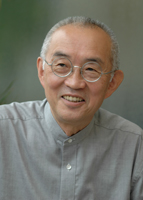Leveraging the Singularity to Challenge the Next Generation Yoshio Tsukio (Professor Emeritus, University of Tokyo)

Singularity generally means “singularity,” but in the field of science and technology, it is translated as “technological singularity,” signifying a discontinuity in which previously valid scientific laws no longer apply.
Singularities have occurred many times throughout history, such as when the Earth, previously thought to be flat, is discovered to be spherical, or when the Earth, previously thought to be the center of the universe, is discovered to be merely one of countless celestial bodies.
However, the term “singularity” began to be used in the field of information science in the 1980s, and came to refer to the era in which artificial intelligence on a level comparable to human intelligence emerges. The term was popularized by American information scientist Ray Kurzweil, who published a lengthy book in 2005 titled “The Singularity Is Near,” which predicted the future of artificial intelligence.
As the Japanese title “The Birth of Posthuman” suggests, the singularity, in which artificial intelligence surpasses human intelligence, will occur in 2045, 40 years after the book’s publication. Furthermore, last year he significantly revised his book, “The Singularity Is Nearer,” to reflect technological advances, in which he explains the arrival of an unknown era.
The book begins by explaining that there have been six major changes since the birth of the universe: the first was the birth of the laws of physics and chemistry; the second was the birth of primitive life forms capable of self-replication; the third was the emergence of brains capable of information processing; the fourth was the acquisition of high-speed information processing capabilities; and the fifth change, which is currently underway, is the arrival of an era in which human brains and digital technology will merge to acquire high-speed, complex cognitive abilities.
The ultimate sixth change will be the spread of human-invented intelligence throughout the universe, but the immediate challenge facing humanity is dealing with the emerging fifth change, and generative artificial intelligence is the technology at the core of this.
While conventional artificial intelligence was the ability to select appropriate answers from existing information, generative artificial intelligence refers to the ability to create answers on one’s own.
What is important is to consider the impact this ability will have on society.
The first is the mass unemployment in the tertiary industry, which accounts for more than 60% of employment in developed countries. Up until now, simple information processing has been replaced by computers and other information technologies, but if generative artificial intelligence also takes over advanced decision-making, both school and social education will require a transformation comparable to the Meiji Restoration.
The response of the education system in this regard will also be important. The current goal of education is to acquire skills that enable students to adapt to modern society, but if the society in which students live changes significantly after completing their schooling, they will end up striving to acquire unnecessary skills. For example, the widespread use of advanced machine translation will raise the question of whether it is appropriate to spend so much time on language education, such as English.
Although there is no clear basis for this, Japan has faced enormous external pressures since the Meiji Restoration and its defeat in the Pacific War 80 years later, and has overcome them to develop. This year marks the 80th anniversary of that defeat. While this number does not have any special significance, this time we are facing external pressure from generative artificial intelligence technology. Addressing this external pressure is an urgent and important issue for Japan.
※Translating Japanese articles into English with AI
